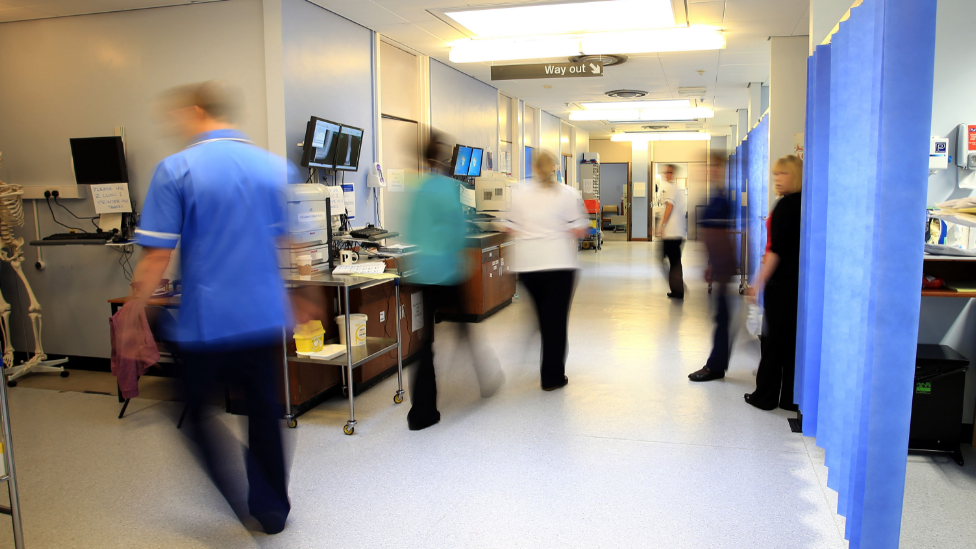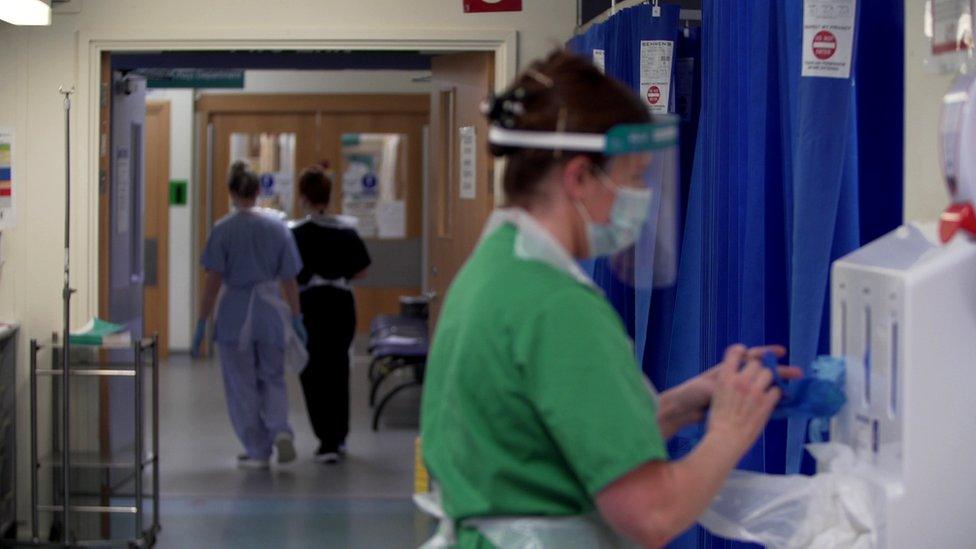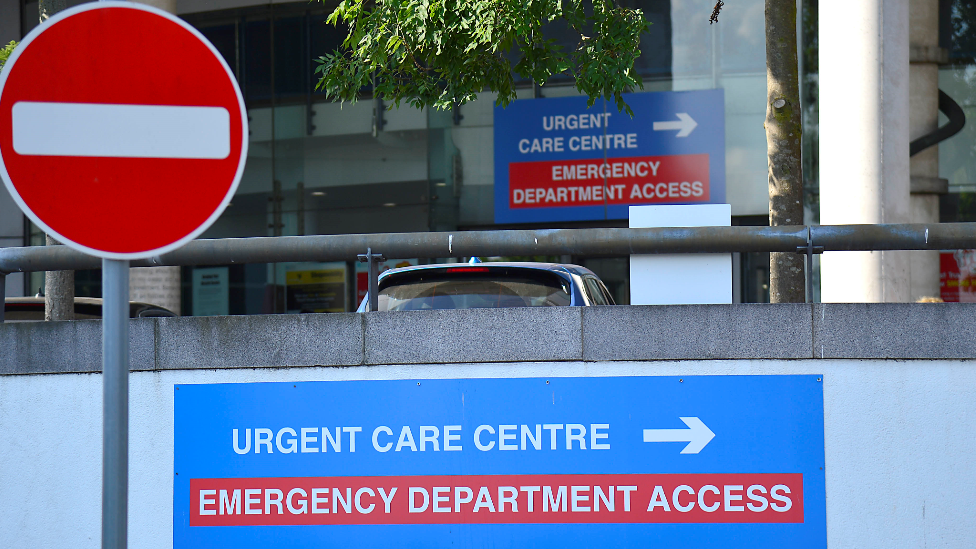Covid-19: Nurse says 'red tape' a delay to increasing staff
- Published

A nurse has spoken of her frustration at the "red tape" that she has said is preventing more staff from getting on to wards.
The nurse, who wished to remain anonymous, has been waiting on the completion of pre-employment checks since being offered bank shifts with the South Eastern Trust in May.
It follows a weekend when health trusts made urgent appeals for off-duty staff.
The trust said checks could sometimes be delayed for a number of reasons.
The nurse said she just wanted to help out.
"I am at home reading these appeals and I could have been down helping," she told BBC News NI.
"It makes my blood boil that 12 weeks after interview I'm still in pre-employment checks when I could have been answering that call."
So-called nursing bank shifts are filled by trained nurses who are available to work flexibly and at short notice to complement the existing workforce.

More than 70 nurses have been successfully interviewed for bank nursing shifts but have not been deployed
A spokeswoman for the South Eastern Trust said checks were carried out as quickly as possible but could on occasion be delayed due to a variety of reasons.
"These may include candidates failing to return their documents in a timely manner, issues of concern arising from health and disclosure checks that require escalation and, most commonly, difficulty obtaining references for candidates," she said.
"Where delays do occur the trust and our colleagues in BSO Recruitment Shared Services Centre endeavour to make sure these are followed up on and actioned as soon as possible to avoid delays in candidates being able to take up posts."
Figures obtained by BBC News NI show that 72 nurses have been successfully interviewed for bank nursing shifts but have not been deployed because paperwork has to be processed.
In Belfast, 37 nurses were interviewed over the last 18 months but are awaiting the completion of checks.
In the South Eastern Trust, 18 nurses are in a similar position.
The Western Trust has two nurses affected while eight are still going through checks in the Northern Trust area.
In the Southern Trust area there are seven nurses going through pre-employment checks.
All five health trusts have also used agency nurses to fill thousands of shifts during the past year and a half, including Belfast (91,792) and Northern Trust (73,522).
The Health Minister Robin Swann said although he understood the pressing need for more staff, he expected "due diligence" to be carried out for anyone going into a professional post.
"It's certainly something I'll be following up on with our service organisations and the trust as well, because we have seen a need for nurses across the system," he told BBC Radio Ulster's The Nolan Show.
"I don't want to be doing anything that discourages anyone from coming forward to help us at this moment in time."
'Twiddling our thumbs'
The nurse said that at some point "the red tape has to go and a common sense approach taken".
"I understand that due process has to be done and that the checks are there for patient and staff safety, but to wait six to 12 weeks to get into a clinical placement, when we constantly hear about staff shortages, does not make sense."
The nurse said there was a potential pool of nurses who are "just dying to get on to the wards to work". She added nurses had specifically done return to nursing courses.
"It's very frustrating especially when you hear about short staffing levels and appeals because people are absent, whether that's through retirement, long Covid, general sickness or isolating," she said.
"And then there are the waiting lists and you hear that A&Es are struggling to cope."

The Royal College of Nursing said recruitment delays are causing frustration
The "sudden spike in quite sick patients" had taken trusts by surprise, according to Dr Paul Kerr from the Royal College of Emergency Medicine.
"What we are witnessing is dreadful crowding in the emergency departments across Northern Ireland, there is lack of access to emergency beds for patients that need emergency admission," he told Good Morning Ulster.
"These are our most vulnerable patients with heart attacks, strokes, infections, traumas and emergency presentations like that.
"This is causing a risk to those patients and indeed a risk to the staff, Covid can indeed spread from patient to patient if these patients are crowded - if 30 or 40 or 50 of them perhaps are crowded in emergency departments, awaiting admission."
Some nurses and doctors were even leaving hospital work as a result of the "dreadful conditions", Dr Kerr said.
'Extremely frustrated'
At the weekend, the Belfast and South Eastern Trusts said rising admissions of Covid and non-Covid patients was putting them under significant pressure and issued appeals on social media. The Western Trust also contacted staff via email.
The Royal College of Nursing (RCN) said recruitment delays were causing frustration.
Rita Devlin, acting director of the RCN Northern Ireland, said the organisation was aware that members and managers were "extremely frustrated" at the length of time it takes to recruit staff into posts. She said the issue had been repeatedly raised with the Department of Health.
"These delays have an impact both on the staff waiting to be appointed and those working in areas within healthcare which are experiencing chronic staff shortages. Ultimately, this impacts upon the patients being cared for," Ms Devlin said.
"While we acknowledge the importance of robust checks and procedures, this process must be expedited to prevent further delays to the provision of much needed treatment and care."
Paula Bradshaw, the Alliance Party assembly member who sits on the Stormont health committee, said the situation was "simply unacceptable".
"At this stage of the pandemic... we need all the experience and expertise we can get working at the front line in the health service," she said.
"We have over the last 18 months recognised the nature of the emergency by implementing exceptional measures across healthcare, public services and in society in general.
"This needs to be recognised also when it comes to the essentials of ensuring our health and social care system has swift access to all the workers it needs, particularly those who are already qualified."
Related topics
- Published26 July 2021

- Published25 July 2021
